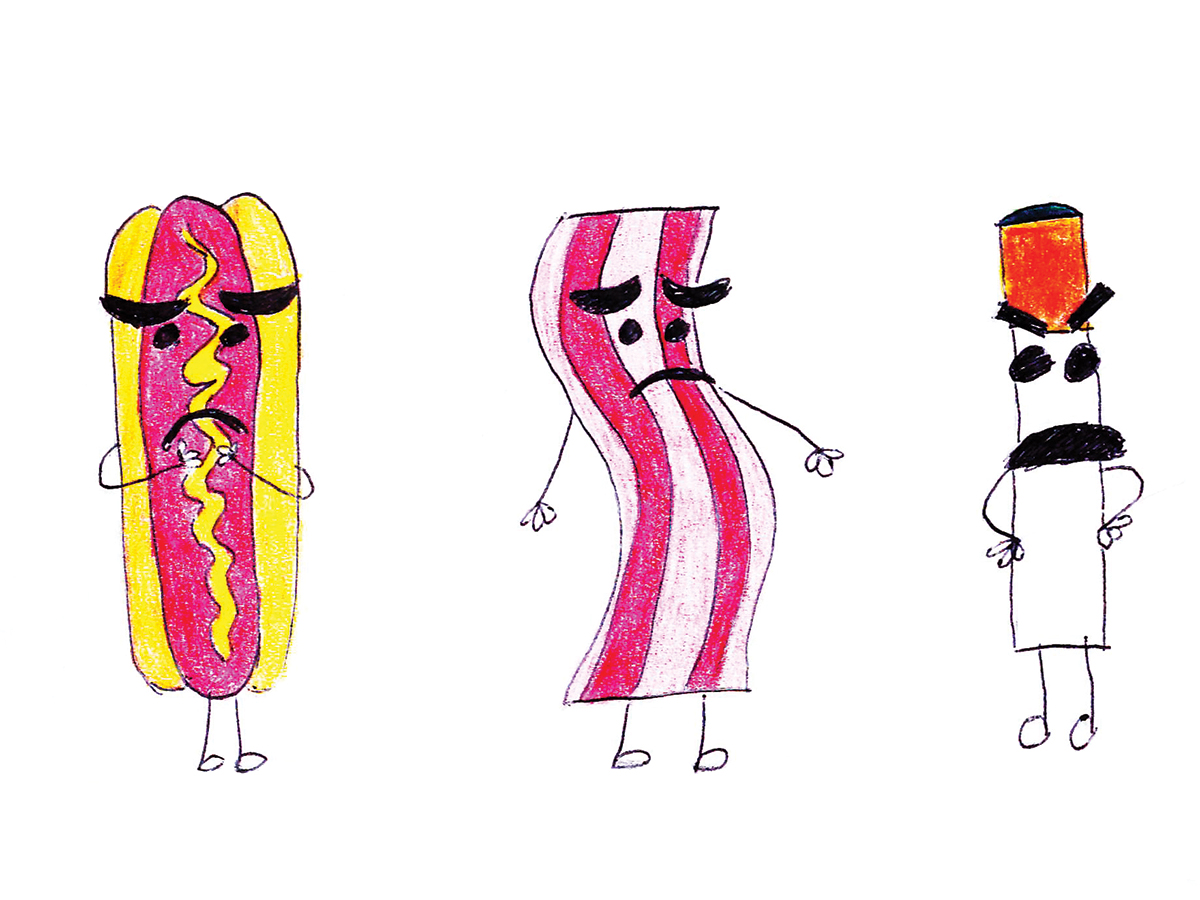
Martha Delgado/HIGHLANDER
Meat consumption in our society is ubiquitous, if not totally glorified. Nearly everything nowadays is bacon-wrapped, contains bacon bits and fried in bacon grease. Meat is not just for eating anymore — it is a gastronomic experience. It has been commercialized and practically eroticized (seen any Carl’s Jr. ads lately?), and associated with daily activities: bacon is essential to the breakfast experience, a hamburger is the perfect lunchtime grub and steak is a delicacy worthy of a fancy date night.
Meat is the magical food that turns boys into “real” men, and svelte ladies into “cool” girls.
And now, it can apparently cause cancer.
The World Health Organization (WHO) has declared that processed and red meat contains dangerous cancer-causing carcinogens similar to that of cigarettes and asbestos.
As a closeted vegan, this revelation was practically a triumph for me. Perhaps my latent survivalist was what kicked in when I decided meat was gross and stopped eating it cold turkey. It was official — like, World Health Organization official: meat is awful. Maybe people would stop staring at me like I had a scarlet “V”on my chest every time I admitted that I did not eat it.
However, that glimmer of hope was extinguished when I realized this would change nothing in the way people approach meat. Especially since there is not enough evidence to decisively say that meat causes cancer.
The statement revealed that it is the process of cooking and curing meat that produces the harmful carcinogens. Although the scientists at WHO classified these carcinogens into the same category as tobacco and asbestos, they are not identical. It simply means that consuming meat is just as likely to cause cancer as smoking a cigarette. Basically, eating a steak does not mean you are eating a cigarette; however, like how a chain smoker is more likely to develop lung cancer, a devoted carnivore is equally at risk for cancer.
While these carcinogens link meat with cancer, it is important to remember that correlation does not necessarily equate to causation. It has not been established that meat itself causes cancer; it merely contains harmful carcinogens that increase the risk of developing cancer. Eating a steak probably will not make you sick, but the carcinogens that are produced when it is cured and cooked definitely harm your body. The uncertainty surrounding meat and cancer hardly makes a convincing argument for a total revamping of people’s diets.
Although the new information is appreciated, it is not a total game changer. It was never a secret that red and processed meat has always been bad for people. It has been constantly linked to high cholesterol and increased risk of heart disease. Cancer is practically a footnote on its resume of consequences. People are still eating meat despite knowing that it can clog arteries and cause heart attacks — and what is more serious than a heart attack?
Similarly, smoking is still prevalent despite fervent and traumatizing campaigns against it. People still get shitfaced even though hangovers suck and liver cirrhosis is imminent. Cars are accident-prone deathtraps, yet we drive them every day. There are constant jarring reminders of our mortality, but we carry on doing things that are potentially harmful to us.
We are suckers for instant gratification: stress relief from smoking, reduced inhibition from drinking and convenient transportation by driving. Meanwhile, meat is exalted as culinary crack — it is delicious for the very same reasons it is bad for you. The fat, grease and juiciness create a flavor sensation that is apparently worth all the long term health consequences.
Like with all of the dangerous things I have listed above, people should simply practice personal discretion when consuming meat, especially with the new revelations about it. Meat has been such a prevalent aspect of our society that assigning restrictions to it will only seem stifling instead of benevolent.
Instead, consuming in moderation and approaching with caution should be promoted. Ultimately, a person has supreme jurisdiction when it comes to what they do to their body. The best course of action is to ensure people are well-informed so that they can consider that information when deciding what to eat.
I have my own reasons for not eating meat so I understand that the decision to abstain from it is a personal and difficult choice to make. In the words of the ultimate carnivore Ron Swanson: “If you want to eat garbage, balloon up to 600 pounds and die of a heart attack at 43 — you can. You are free to do so. To me, that’s beautiful.”








